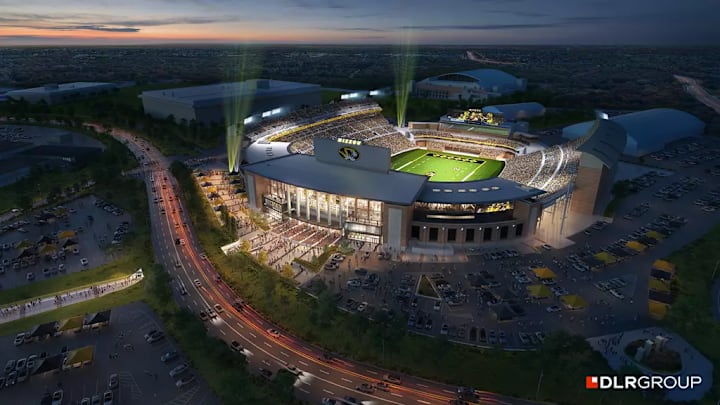Mizzou Athletics Looks to Continue Momentum with Final Approval of Stadium Project

KANSAS CITY, Mo. — The University of Missouri Board of Curators unanimously approved Mizzou athletics’ $250 million project of renovations for Memorial Stadium.
The athletics program is looking to seize the opportunity to capitalize off the momentum it built off the heels of a 11-2 football season and with other programs on the rise.
“The failure to invest in this today,” Bob Blitz, the Missouri chair of intercollegiate athletics, said in a press conference, “will create a rapid decline in what is now a rapidly improving program.”
The university hopes the investment, the wealthiest ever put into an athletics facility for Missouri, will not only build off the momentum but lay the foundation for years to come. To turn success into a consistent standard.
“What you want to do,” SEC Commissioner Greg Sankey, on hand for the meeting, said, “is lay a foundation upon which you continually build to achieve success… (That’s) exactly what you're seeing here today.”
The project will break ground on Saturday, November 30, following Missouri’s regular-season finale against Arkansas. The renovations focus on the north end zone and premium seating improvements.
The project is expected to be completed by Missouri’s first game of the 2026 season, with work continuing throughout the 2025 season. It will make its debut in the premiere game for the 100th season of play at Memorial Stadium.
The project will be the next step in adding to what Missouri athletics director Laird Veatch believes is already an iconic venue. When being recruited by Missouri in the early ‘90s, the eventual Kansas State linebacker was impressed with the historic stadium.
“I remember being impressed with the stadium at that point compared to the others I had seen at that point and the changes that had not been made,” Veatch said. “But it's evolved dramatically since then.”
Veatch has experienced plenty of change in the college football landscape in his time in athletic departments in a wide variety of conferences. The changing landscape of the sport has made clear what it takes to succeed as a football program and why these changes are crucial to continued success.
“It really is important that we invest not only because of the fan experience and the experience for the players on the field,” Veatch said, “but this will solidify our long term ability to generate the revenue we need to continue to compete.”
Missouri isn’t the only team nationally making changes to their stadium, which is another important reason for these changes. Besides the success and state of a football program, there might not be a bigger selling point than a team’s stadium.
“We learned that the most public facing signal of championship expectations is quality of the stadium of the university and you can see we're looking for championships,” said Blitz.
The need to raise money for improvements to athletic facilities goes hand-in-hand with the acquisition of talent for those programs. The rise of NIL might have made dazzling recruits with impressive facilities less important.
However, improved facilities, drawing more revenue, allows programs to reinvest into NIL funds. A balance of the two, according to Veatch, is instrumental in a program’s success.
“It doesn't change the need to acquire talent on the field,” Veatch said. “This isn't an either or situation, it's got to be both.”
With upgrades and additional capacity for premium seating, along with numerous other facility upgrades, the fan experience is expected to improve greatly and draw a significant increase in revenue. UM President Mun Choi estimated in April that the revamped stadium could increase economic impact on the city by hundreds of millions.
The north side of the stadium will see significant changes, introducing the Rock M club and an expanded video board.
The most glaring of the additions will come at the entrance of the stadium, modernizing it with an open view and adding six columns to commemorate the tradition of the columns on the university’s campus.
“(The project adds) a new front door, the gateway on the south side of campus,” said Ryan Freeland, the design lead for the project, "Really starting to play off of tradition, celebrating the six columns with that entry sequence at gate one.”
The video board on the northside will see changes, as its size will increase by 20% according to Freeland.
Plenty of new seating will be added at various spots throughout the north side, including box, field and premium level suites. 24 new “Tiger Den” suites will be added with an open-concept plan and a social atmosphere.
Other small additions Memorial Stadium will see include updated restrooms, an upgraded sound and LED light system, improved WiFi and revamped ribbon boards.
Mizzou athletics hopes these improvements will simultaneously bring in revenue for the athletic department, while selling more tickets and driving fans into seats.
The decision for the investment comes with heavy trust in the football program, the leaders of the athletic department and the fans.
“This investment is only possible because we believe in coach (Eli) Drinkwitz,” Choi said. “We believe in the student athletes, we believe in the coaching staff. This is also possible because we believe and support fans throughout the state of Missouri and beyond.”
With Missouri looking toward the future, it has a clear goal in mind for what success the project will bring for Missouri athletics.
“This facility is designed to bring championships to Mizzou,”Choi added. “We can see them in our grasp.”

